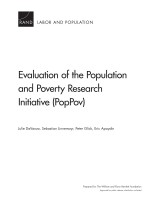| 来源类型 | Research Reports
|
| 规范类型 | 报告
|
| 来源ID | RR-527-1-WFHF
|
| Evaluation of the Population and Poverty Research Initiative (PopPov) |
| Julie DaVanzo; Sebastian Linnemayr; Peter Glick; Eric Apaydin
|
| 发表日期 | 2014
|
| 出版年 | 2014
|
| 页码 | 150
|
| 语种 | 英语
|
| 结论 |
The Program Has Increased Numbers of Economists Doing Research on PopPov Priority Topics but Not of Senior Researchers or an Emphasis on Economics- PopPov has increased the number of economists working on PopPov issues, although many of these were already working on these topics or, in the case of the fellows, intended to work on them. The initiative has not brought many new senior researchers into the field. The program has enabled researchers already in the field to do more than they may have been able to do without PopPov funding. It has also increased the number of European researchers working on population, health, and development topics.
Published Papers Do Not Proportionately Focus on PopPov Areas of Emphasis- Many papers prepared for PopPov are not on one of PopPov's primary research questions. The majority of fellows and researchers supported are economists, but only 25 percent of the journal articles supported by PopPov are in economics journals.
PopPov Research Does Not Appear to Be Reaching Economic Policymakers to Influence Policy Decisions- Relatively few researchers assigned a high priority to translating their research into policy messages or presenting their findings at forums likely to be attended by policymakers.
- Many who could potentially use PopPov findings in their policy, communication, or advocacy work have little, if any, awareness of PopPov and the research it has supported.
|
| 摘要 |
- Prioritize objectives; design strategies to achieve them. Establish a standing steering or advisory committee. Look for niches for which there is not already funding available.
- Direct topics to be addressed. Encourage applicants to propose the types of data and methods that are most appropriate for their research questions. Consider awarding some larger and longer-term grants.
- Include more reviewers of research proposals with policy and program experience. Give more weight to policy relevance in making project funding decisions. Continue stakeholder meetings. Have fellows and junior researchers work on approaches to problems designed with policymakers' help.
- Prioritize research proposals that include training components.
- Prioritize fellowship applicants from SSA and others from developing countries who are not U.S. citizens or permanent residents. Include a former PopPov fellow on the selection committee. Include training on policy communication as part of PopPov fellowships.
- Try to attract high-quality applications from African students and scholars. Bring African fellows to receive training in the United States or Canada and continue mentorship after returning home.
- Continue PopPov conferences; have them focus more on findings than on methodology, and focus them more topic-wise. Continue poster sessions; enable more networking. Make clear each session's topic and target audience; publish conference proceedings. Have some discussants from outside the network. Hold a conference in the United States and at different times of year. Establish formal links with meetings of related groups.
- Mention PopPov more prominently on the Population Reference Bureau website. Update the PopPov website and make it more appropriate for non-researchers. Make briefs more appropriate for policy audiences. Disseminate them broadly.
|
| 主题 | Africa
; Demographics
; Developing Countries
; Economic Policy
; Family Planning
; Populations
|
| URL | https://www.rand.org/pubs/research_reports/RR527-1.html
|
| 来源智库 | RAND Corporation (United States)
|
| 资源类型 | 智库出版物
|
| 条目标识符 | http://119.78.100.153/handle/2XGU8XDN/107798
|
推荐引用方式
GB/T 7714 |
Julie DaVanzo,Sebastian Linnemayr,Peter Glick,et al. Evaluation of the Population and Poverty Research Initiative (PopPov). 2014.
|
|
文件名:
|
x1495316359755.jpg
|
|
格式:
|
JPEG
|

|
文件名:
|
RAND_RR527-1.pdf
|
|
格式:
|
Adobe PDF
|
除非特别说明,本系统中所有内容都受版权保护,并保留所有权利。